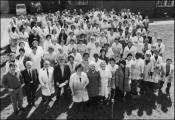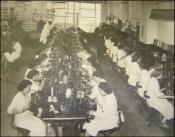Sorted by interview reference
VSE061 Gwynedd Lingard, BSA Tools, Cardiff
Gwynedd left grammar school at 16 (uncertain) (1950) to further her dreams of being a gymnast. She was selected for the Olympic team in 1952 – talks of the response of her area- flags and a street collection. She worked for Boots’ Chemist but they wouldn’t allow her time off so she went to work in the office in BSA Tools, which made scientific tools, microscopes etc. They gave her time off with pay. Her father built her a balancing beam in their lounge! Notes that when she went training in 1952 she had to take her own food coupons. Also the clothes rations and the cost of the uniform. Men on factory floor – wolf whistled when she went down there. She was the material control clerk, checking the stores and keeping the books. Men never offensive but they did ‘torment ‘ her. Describes a fatal accident in the furnace there. Dismal building – noise and smell. She left at 19 (1954) – she was pregnant. Accident on the way to work and taken to hospital by the boss. When a man pestered her (out of work) her boss sorted it out. Her father was a good swimmer and her mother a great runner and played baseball for Gripoly Mill though she didn’t work there. Later she went back to work, for the Gas Board (1972 until 1992). She talks about the Olympics in Helsinki and becoming an international coach.
VSW061 Eirlys Lewis, Vandervell Productions, Cardiff;Mettoys, Fforestfach;Alan Paine, Ammanford;Pullmans Flexolators, Ammanford
Eirlys left school at 15 (1964) and started in Pullman’s Flexolators, making car seats, springs etc. Everyone got on there. Smoking while working. Paying Union fees but not the % to the Labour Party. Dirty work. One dangerous job because of acid - coating things with paint. Teasing young workers – fetching elbow grease. She learned to live there. Lots of swearing. She heard about the Aberfan disaster when in the Alan Paine factory. She made a mistake going there (stayed only 9 months); then to Mettoys for 3 years (1966-9) on the assembly making toy cars. Some of the girls were very fit. Then she worked on a farm for 2 years. In 1972 she went to Vandervell Products, Splott, Cardiff – for 10 years making car and lorry parts. They opened a new department (c.1976) and girls now did the same jobs as the men. One man asked for her help. Interviewed by the BBC about her job as a mechanic. Social club – she played ninepin bowling. Good money. One woman lost her fingers in a machine – compensation. In 1976 there was a strike about being too hot – she refused to join because she believed the company was doing its best. She was sent to ‘coventry’ for 4 months. One woman objected to her speaking Welsh – answered her back. Girls not allowed to work on night shift. Then she got married and worked for periods in Llangadog milk and Carmarthen cheese factories.

VSE062 Edith Williams, OP Chocolates, Merthyr;Kayser Bondor, Merthyr
Edith left school at 14+ (1946) and started at Kayser Bondor Factory, heeling the stockings. Piecework. She went to ?Buckingham Palace (Westminster) to try to keep the factory open in 1977. She was a union girl (Hosiery Workers’ Union) – lots of disputes about money and she would have to negotiate between parties. Take over by Courtaulds – writing on the wall. She went to OP Chocolates then making cheese balls and putting them in tins. Tells story of her trouser elastic failing and calling for someone to take over from her on the line. She worked there for 6½ years. In Kayser Bondor the men did shift work but nor the women. Sporting facilities – table tennis, tennis etc. Xmas dances at City Hall, Cardiff. Factory choir. Specialised skill to sew seams in stockings.
VSW062 Sylvia Howell, Salter, Llanelli;John Stanton, Llanelli
Sylvia left grammar school with O Levels when she was 17. She intended becoming a nurse, but married instead. She worked in shops and at the Opticals, Cydweli but after her son was born she started in John Stanton’s as a top sewing machinist in 1967 (until c. 1969) – quite a posh factory. They made clothes for M&S, Targets, time and motion and bonuses. Injuries with the sewing needles. There wasn’t a union and when they tried to unskill her job she moved to the Salter’s Factory (1969-78) -as a calibrator, making scales. She worked for the money but the company was good too. She moved to inspection in the warehouse. They bought seconds in both factories and there was some pilfering. Salter’s closed in 1978.
VSE063 Susan Leyshon, Revlon, Maesteg
Working in the Revlon Factory was holiday work from College for Susan. On the first day she had a huge shock to hear the improper language but she became used to it. She had another shock when she tried to keep up with the assembly line – fixing the lids of the nail varnish. She was stopping the girls from reaching their targets to earn money. She was filling in during the factory’s annual holiday. Then she was moved to the office to work. The girls weren’t very supportive of the temporary students. She bought her make-up cheaply at the factory. Everyone escaped when the bell rang at the end of the day. She respected the girls for sticking the job.
VSW063 Yvonne Bradley, Morris Motors, Llanelli
Yvonne left school at 14 (1963). She went to Morris Motors in 1967, welding silencers (ha’penny for each one). Met her husband there. Reported bullies to the office. Refused to be union rep or forewoman because not confident of writing skills. But other skills – suggesting ways of improving plugs and machine doors. Managers etc took advantage because she couldn’t put her ideas on paper. Unfair practice – women losing jobs because on maternity leave. She had her son in 1971 but went back part-time (for 5 years) – then full-time then redundant, then on a temporary contract. Attitude to factory girls – she learned to swear. Women better workers than men. Men more militant. Heavy work on the ‘seats’ – arthritis today. Damage to ears, tinnitus. Gas visor and spats etc for welding. Gas explosions – burning hair. Caught arm in a conveyor belt. Paying union fees in toilets, before the union was established - it was a closed shop. Altogether she worked there 40 years. Initiation ceremony for new boys – ‘tickling’ them. If anyone got married - covered in mess. Strikes. The workers had the power. Got 25% off a new car – but couldn’t afford it! Practical jokes. She was very militant. Decorating machines at Xmas and lots of booze. She was in the shooting team. Darts nights and Miss Morris Motors competition. Finished there in 2006.
VSE064 Martha Irene Lewis (Rene), Bernard and Lakin, Mountain Ash;Alexon Steinberg, Treforest
Irene left school at 14 (1941) and stayed at home to help her mother for 4 years before starting in Steinberg’s in 1946 (new factory). She worked on the buttons – for skirts and suits. She used to be used as a model to try on some of the clothes. Many of the clothes went to America – they were expensive clothes. On Saturdays they had open days – people could buy seconds. Her sister had a nervous breakdown while there – but she was given a light job to help her get better (she stayed there for 50 further years and got a gold watch!) Music and singing. She couldn’t afford many clothes from the factory. The factory was dry because of the dust from the clothing. It was hot because they were making heavy winter clothes in summer. She stayed there until 1952 and left when she was pregnant. In the early 1960s she went to another clothes factory – Bernard and Lakin. She was there for c. 3 years.
VSW064 Keith Battrick, London Transformers Factory, Bridgend
Keith describes his traumatic experience as a 16 year old aspiring tool-maker in London Transformers in 1966. He experienced an initiation rite which involved stripping and covering him with oil and saw-dust. Both the male and female workers in the factory participated in this. The worst part was being unable to clean himself thoroughly afterwards. He left the factory because he couldn’t get an apprenticeship there. Today he is a self-employed electrician.
VSW065 Margaret Young, Corgi Hosiery, Ammanford
Margaret left school at 15 and joined Corgi’s in 1958. She has worked there for c. 53 years. She describes their products: socks initially, (with different patterns); then jumpers, tapestry clothes etc. She earned a wage + bonuses. There were no unions and no strikes. She moved from socks to knitwear. She describes how they treated girls on their birthdays and when they got married. It was very cold there and their toilet breaks were timed. They brought in records to play over a tannoy. When her children were small she borrowed a machine and worked from home. Trips out. She works on hand repairs in the factory now.

VSE066 Alice Jill Baker, St Margaret's Clothing Factory, Aberbargoed
Jill left school at 16 (1953) and started in the garment factory, making clothes for M&S. They made blouses, men’s pyjamas and liberty bodices. She discusses the different jobs. Jill had polio as a child and in the factory the treadle of the machine was adjusted for her. Piecework, - collars would be 2/6 a dozen. She was good at collars and zips. She could do 10 dozen zips a day. She explains the intricacies of working for bonuses. Time and motion. The buyers for M&S were very thorough. She enjoyed the company but hated sewing. Although some were rough and swore they would help others out if necessary. Other factories in England and there would be a beauty queen competition in Bargoed itself. They also had a newsletter. Wages - to mother and pocket money. Not on board and lodging until 18. She talks about the new fall-back rate which meant less money and she walked out because it was unfair and because the supervisor was rude to her. She had worked there for 10 years. She returned part time later but by then, things weren't the same. Factory work was an experience for her.


